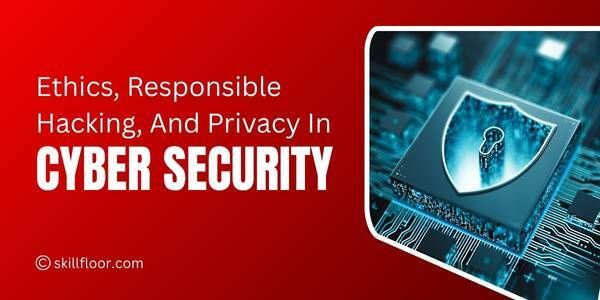Cyber Security Career Paths
Explore rewarding cyber security career paths to protect digital assets. Discover key roles, skills, and opportunities in this dynamic field.

Ever wonder how the largest tech businesses in the world protect their data against the increasing number of cyber threats? Or how do governments maintain the security of sensitive data in a world that is becoming more interconnected? You're not alone if you've thought about cybersecurity experts' exciting and important role in today's digital environment. There has never been a greater need for cybersecurity professionals, and investigating the cybersecurity career paths could be the start of a stimulating, fulfilling, and safe career. Cybersecurity experts have emerged as the unsung heroes of the modern day, preserving national security and preventing cyberattacks.
I have had the opportunity to work in cybersecurity for more than five years, so I have direct experience with the industry's fast growth. There were fewer specialist positions and less understanding of how cybersecurity affects every facet of our online life when I first started. The landscape is completely different in the modern era. Career paths and employment options have significantly increased as a result of the ongoing evolution of cyber threats. Organizations and governments are racing to protect their networks and data from criminals, making cybersecurity one of the most important areas of technology today.
Network security professionals and IT specialists handling security problems were the most common positions when I first started working in the industry. However, the necessity for specialized positions increased along with technological advancements. Nowadays, there are many different types of cybersecurity jobs, ranging from risk analysts to ethical hackers and all points in between. The cyber security career paths that are in high demand and provide financial benefits, security, and a feeling of purpose will be examined in more detail in the next section.
The Growing Demand for Cyber Security Professionals
Understanding why cybersecurity has grown to be such an important sector before getting into specific career options. Global spending on cybersecurity is expected to go above $1.75 trillion between 2021 and 2025, according to a 2023 report from Cybersecurity Ventures. Organizations in every industry now prioritize cybersecurity due to the increase in cyberattacks, which can range from ransomware attacks to data breaches. Every industry currently faces serious security threats as a result of the continuous transition to remote work, digital transactions, and cloud computing.
In addition, the growing variety of cyber threats has made a wide variety of cybersecurity experts urgently needed to counter these attacks. There are many options for people who want to work in cybersecurity, whether it's protecting online banking systems or preventing data breaches at medical facilities.
Let's now explore the career paths in cyber security that are essential to the safety and security of our digital life and are also in great demand.
Key Domains of Cyber Security for Career
There are several specialist areas within cybersecurity, each focusing on a distinct element of safeguarding digital information. Network security, cloud security, risk management, penetration testing, and incident response are important domains that provide professionals with specific expertise with a variety of job options.

1. End Point Security
Overview: Protecting employee-used devices on a network, including workstations, laptops, tablets, and smartphones, is known as endpoint security. Endpoint security attempts to shield devices against malware, ransomware, and unauthorized access as thieves target these entry points an increasing amount.
Key Responsibilities:
-
Implementing in place and monitoring endpoint security software (firewalls, antivirus, and anti-malware).
-
Monitoring device activity to find vulnerabilities and questionable behaviours.
-
Ensuring that gadgets fit corporate security guidelines and are encrypted.
-
upgrading software and performing routine security assessments to reduce new threats.
Why It's Important: Endpoints are more vulnerable than ever due to the growth of remote work and BYOD (Bring Your Own Device) rules. An effective endpoint security plan lowers the possibility of data breaches and device-specific attacks.
Skills Needed:
-
Knowledge of endpoint security technologies, such as Sophos and CrowdStrike.
-
Familiarity with device administration and encryption techniques.
-
Experience with threat detection and incident response.
Salary: Depending on location and experience, endpoint security specialists usually make between $70,000 and $110,000 a year.
2. Network Security
Overview: The goal of network security is to defend an organization's infrastructure and networks from online attacks. It involves safeguarding the software (firewalls, VPNs) and hardware (routers, switches) that control and route traffic both inside and between networks.
Key Responsibilities:
-
Setting up and managing intrusion detection systems, firewalls, and VPNs.
-
Keeping an eye on network traffic to look for irregularities or security risks.
-
identifying vulnerabilities in the network design and suggesting solutions.
-
Implementing best practices for network segmentation and access control into practice in collaboration with other security experts.
Why It's Important: Network infrastructure security is essential as more companies transition to digital-first environments. An organization's data is safeguarded by effective network security, which also makes sure that private data is not intercepted or compromised while being transmitted.
Skills Needed:
-
Understanding network security technologies, such as Wireshark and Snort.
-
Knowledge of network protocols (HTTP, DNS, TCP/IP).
-
Strong knowledge of intrusion detection/prevention systems (IDS/IPS), firewalls, and virtual private networks (VPNs).
Salary: Typically, network security professionals make between $80,000 and $130,000 per year.
3. Cloud Security
Overview: The goal of cloud security is to safeguard data, apps, and systems that are hosted on the cloud. As businesses around the world depend more and more on cloud services like AWS, Azure, and Google Cloud, protecting cloud infrastructures has become crucial.
Key Responsibilities:
-
Designing and implementing into practice cloud security measures.
-
To safeguard cloud resources, identity and access controls (IAM) must be managed.
-
Conducting penetration tests and vulnerability assessments on cloud platforms.
-
Ensuring compliance with data protection laws (such as HIPAA and GDPR).
Why It’s Important: As organizations move more workloads to the cloud, they need experts who can secure their cloud infrastructure. A single breach in the cloud environment can have far-reaching consequences, making cloud security vital for business continuity and trust.
Skills Needed:
-
Experience with major cloud platforms (e.g., AWS, Microsoft Azure, Google Cloud).
-
Familiarity with cloud security tools (e.g., Cloudflare, Prisma Cloud).
-
Knowledge of cloud security best practices (e.g., secure access, encryption).
Salary: Cloud Security experts typically earn between $100,000 and $160,000 annually.
4. Risk Assessment
Overview: Experts in risk assessment find and analyze possible threats to an organization's information systems. They assist companies in setting resource priorities so they can efficiently manage and reduce risks by evaluating threats and vulnerabilities.
Key Responsibilities:
-
Understanding and assessing the risks associated with both digital and physical assets.
-
Performing impact analyses and risk analyses for both new and old systems.
-
Developing plans for risk management and making recommendations for mitigation techniques.
-
Ensuring compliance with industry-specific norms and laws (such as NIST and ISO 27001.
Why It’s Important: Risk assessment is essential for helping organizations understand their security posture and prioritize actions that can mitigate the most severe risks. Effective risk management ensures that resources are focused on high-priority threats, reducing the likelihood of major security incidents.
Skills Needed:
-
Experience with risk management frameworks (e.g., NIST, COBIT).
-
Strong analytical skills for identifying and quantifying risks.
-
Knowledge of regulatory compliance standards.
Salary: Risk Assessment professionals typically earn between $85,000 and $130,000 annually.
For more information: Financial Risk
5. Penetration Testing (Ethical Hacking)
Overview: Organizations hire penetration testers, commonly referred to as ethical hackers, to imitate cyberattacks and find vulnerabilities in their systems before malicious hackers can take advantage of them. Through proactive testing, they help enterprises in improving their security posture.
Key Responsibilities:
-
Identifying vulnerabilities in networks, systems, and applications by simulating attacks (ethical hacking).
-
Creating thorough reports on results that include the seriousness of the hazards and recommended solutions.
-
Collaborating with the security and IT departments to address vulnerabilities that have been found.
-
keeping updated on new technologies, hacking methods, and threats.
Why It’s Important: Penetration testers provide valuable insights into an organization’s weaknesses by mimicking real-world attacks. Identifying these weaknesses early helps prevent potential breaches and minimize damage from future attacks.
Skills Needed:
-
Proficiency in hacking tools and techniques (e.g., Metasploit, Burp Suite).
-
Strong knowledge of programming languages (e.g., Python, Java, C).
-
Familiarity with operating systems (Linux, Windows) and web application security.
Salary: Penetration testers typically earn between $80,000 and $140,000 per year, with top experts earning even more.
6. Network Security Engineer
Overview: The Network Security Engineer is a key position in cybersecurity. This expert is in charge of planning, putting into place, and managing the security infrastructure of a company. Ensuring secure data transmission and safeguarding networks against cyberattacks and unauthorized access are the primary goals.
Key Responsibilities:
-
Creating and maintaining VPNs, intrusion detection systems, and firewalls.
-
keeping an eye on network traffic for irregularities or potential risks.
-
Implementing in-place network security measures to stop illegal access.
Why It’s Important: Since more people are working remotely and using cloud services, it is more important than ever to secure an organization's networks. To stop attacks like Distributed Denial of Service (DDoS) attacks and illegal access to private information, network security engineers are essential.
Skills Needed:
-
Proficiency in firewall management, VPN technologies, and network security tools.
-
Understanding of encryption, network protocols, and security software.
-
Knowledge of security frameworks like ISO/IEC 27001.
Salary: Network Security Engineers can earn anywhere between $70,000 and $120,000 per year, depending on experience and location.

7. Cybersecurity Analyst
Overview: To identify any threats, cybersecurity analysts are in charge of keeping an eye on and evaluating an organization's security systems. When it comes to spotting and fixing security breaches, they are frequently the first line of protection.
Key Responsibilities:
-
Monitoring networks and security systems for indications of cyberattacks.
-
Analyzing security events to ascertain their impact and cause.
-
Developing and implementing into practice response strategies to lessen risks.
Why It’s Important: Cybersecurity analysts are the first to respond to cyber threats, making sure that companies can promptly identify and contain crises. They play an important role in reducing the damage that security breaches can inflict.
Skills Needed:
-
Knowledge of threat intelligence tools and security incident management.
-
Experience with SIEM (Security Information and Event Management) systems.
-
Strong analytical and problem-solving skills.
Salary: A cybersecurity analyst typically earns between $65,000 and $100,000 annually.
8. Chief Information Security Officer (CISO)
Overview: Managing an organization's whole information security strategy is the responsibility of the CISO, an executive-level role. They guarantee that all departments follow security standards and that the infrastructure and data of the company are safe from online attacks.
Key Responsibilities:
-
Creating and carrying out a cybersecurity plan for the entire organization.
-
Managing and directing a group of security experts.
-
Ensuring adherence to laws and industry norms.
-
Informing stakeholders and top leadership about cybersecurity threats.
Why It’s Important: When it comes to cybersecurity, the CISO is the primary decision-maker. To adapt to new cyber threats and develop a security-conscious culture inside a business, their leadership and strategic direction are essential.
Skills Needed:
-
Extensive knowledge of cybersecurity management and risk assessment.
-
Leadership and management skills.
-
Experience with budgeting and overseeing large-scale cybersecurity initiatives.
Salary: CISOs are some of the highest-paid cybersecurity professionals, with salaries typically ranging from $150,000 to $300,000 or more, depending on the company and the size of the organization.
For more reference: Cybersecurity jobs
The Future of Cybersecurity Careers
The demand for cybersecurity experts will only increase as technology develops more and cyber threats become more complex. The need for information security analysts is predicted to increase by 35% between 2021 and 2031, which is significantly faster than the average for other jobs, according to the U.S. Bureau of Labor Statistics. The rising complexity and frequency of cyberattacks, along with the growing dependence on digital technologies across all industries, are the primary causes of this growth.
In addition, because companies of all sizes are at risk of cyberattacks, cybersecurity experts can find employment in a variety of sectors, such as government, healthcare, education, and finance. Additionally, there are consultancy opportunities that let experts share their knowledge with several companies.
As we've seen, there are many different tasks available in the cyber security career paths, and each one is essential to protect against online attacks. The cybersecurity industry is broad and expanding quickly, no matter your interest in executive roles like a CISO or technical positions like penetration testing. Now is the ideal moment to think about pursuing a career in cybersecurity because there is a greater need than ever for qualified workers.
Knowing these job pathways and the abilities needed for each might help you find a rewarding and significant profession in the field of digital security, whether you're just starting out or thinking about changing careers. The demand for dedicated experts in cybersecurity will only increase as technology develops, making this a safe and promising career path.




























































